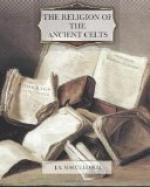[1171] Curtin, Tales, 156; see p. 170, supra.
[1172] Curtin, Tales, 156; Campbell, Superstitions, 241; Folk-Lore, xiii. 60; Le Braz{2}, i. 213.
[1173] Folk-Lore, ii. 26; Yeats, Celtic Twilight, 166.
[1174] Tertullian, de Anima, 21.
[1175] Reinach, RC xxii. 447.
[1176] Val. Max. vi. 6; Mela, iii. 2. 19; Plut. Virt. mul 20.
[1177] See p. 229, supra.
[1178] Le Braz{2}, i. p. xxxix. This is only one out of many local beliefs (cf. Sebillot, ii. 149).
[1179] Procop. De Bello Goth. vi. 20.
[1180] Claudian, In Rufin. i. 123.
[1181] Sebillot, i. 418 f.
[1182] de Defectu Orac. 18. An occasional name for Britain in the Mabinogion is “the island of the Mighty” (Loth, i. 69, et passim). To the storm incident and the passing of the mighty, there is a curious parallel in Fijian belief. A clap of thunder was explained as “the noise of a spirit, we being near the place in which spirits plunge to enter the other world, and a chief in the neighbourhood having just died” (Williams, Fiji, i. 204).
[1183] de Facie Lun[oe], 26.
[1184] See Hartland, Science of Fairy Tales, 209; Macdougall, Folk and Hero Tales, 73, 263; Le Braz{2}, i. p. xxx. Mortals sometimes penetrated to the presence of these heroes, who awoke. If the visitor had the courage to tell them that the hour had not yet come, they fell asleep again, and he escaped. In Brittany, rocky clefts are believed to be the entrance to the world of the dead, like the cave of Lough Dearg. Similar stories were probably told of these in pagan times, though they are now adapted to Christian beliefs in purgatory or hell.
[1185] Le Braz{2}, i. p. xl, ii. 4; Curtin, 10; MacPhail, Folk-Lore, vi. 170.
[1186] See p. 338, supra, and Logan, Scottish Gael, ii. 374; Folk-Lore, viii. 208, 253.
[1187] Le Braz{2}, i. 96, 127, 136f., and Intro, xlv.
[1188] Philostratus, Apoll. of Tyana, v. 4; Val. Max. ii. 6. 12.
[1189] Le Braz{1}, ii. 91; Curtin, Tales, 146. The punishment of suffering from ice and snow appears in the Apocalypse of Paul and in later Christian accounts of hell.
[1190] RC xxvi. 153.
[1191] Bk. iv. ch. 36.
[1192] Erdathe, according to D’Arbois, means (1) “the day in which the dead will resume his colour,” from dath, “colour”; (2) “the agreeable day,” from data, “agreeable” (D’Arbois, i. 185; cf. Les Druides, 135).
CHAPTER XXIII.
REBIRTH AND TRANSMIGRATION.




